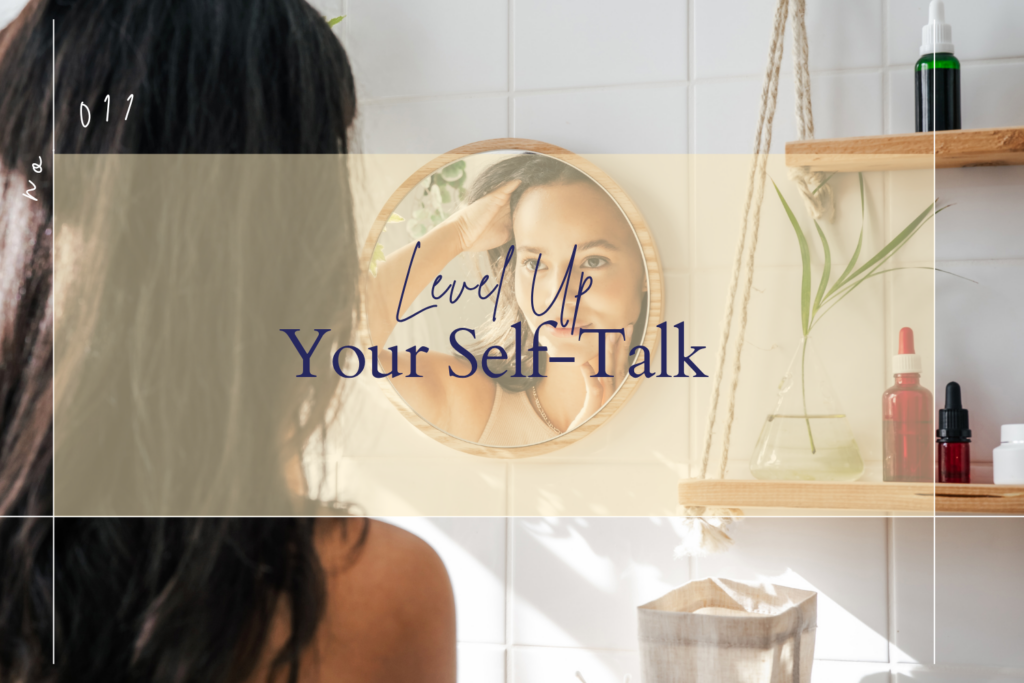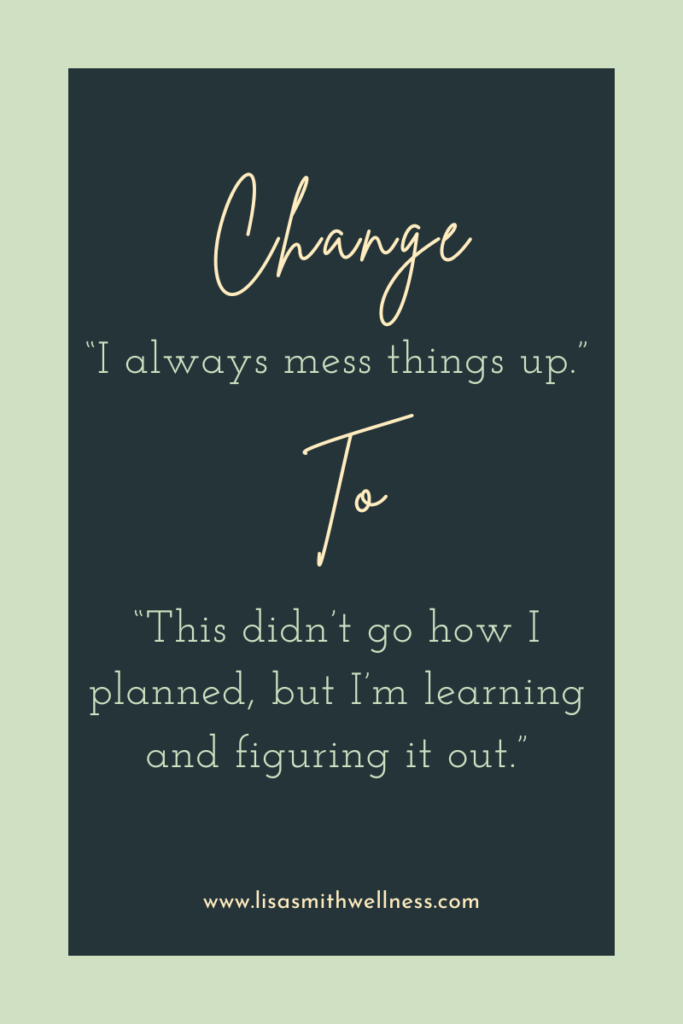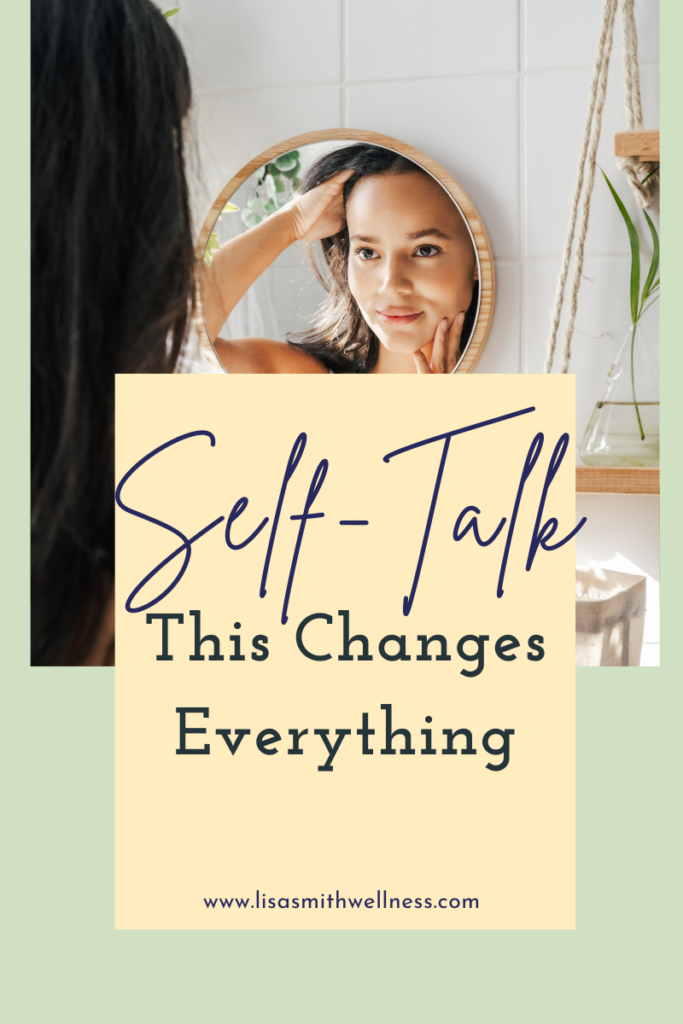Because your inner narrator might be a jerk.
Let’s talk about something that has the power to completely transform your health, happiness, and how long you spiral after accidentally waving back at someone who wasn’t waving at you: your self-talk.
Yep, that little voice in your head. The one that can go from “You’ve got this!” to “Wow, you’re a disaster” in under four seconds. It’s like living with an overly dramatic roommate who critiques your every move, outfit, and life choice.
But here’s the good news: You can train that voice. You can shift the inner dialogue from “I can’t” to “Watch me,” and no, it’s not sappy, overused positivity. It’s neuroplasticity, baby. So let’s dig in.
This post contains affiliate links meaning I make a small commission at no extra cost to you. Thank you for supporting the work of Lisa Smith Wellness and the Pretty Well Podcast!
Why Your Self-Talk Might Be Sabotaging You (and What to Do About It)

Have you ever looked in the mirror and thought, “Wow, I look exhausted, puffy, and slightly haunted?” Or maybe tried on jeans and thought, “It’s like they were designed to hurt my feelings.” You’re not alone.
In fact, if self-deprecation were an Olympic sport, most of us would already have gold medals and a Wheaties box. But let’s not pretend it’s harmless. That internal commentary—those “I’m not good enough” or “Who do I think I am?” zingers—can quietly shape our decisions, relationships, and even our health.
Negative self-talk isn’t just bad manners. It’s bad for your brain, your body, and your future.
Here’s the nerd-y science-y part of self-talk:
When we repeatedly think self-critical thoughts, they actually create neural pathways in the brain. Like well-worn hiking trails of shame. And the more often we walk them, the easier it is to keep going down that path of self-doubt, imposter syndrome, and perfectionism-induced paralysis.
And because our brains love efficiency, they’ll keep defaulting to those well-traveled trails unless we intentionally start building new ones. (Hang with me: It’s totally possible.)
Let’s Get Real: You’d Never Say That to a Friend
Have you ever thought about how we say things to ourselves that we would never say to someone we care about?
Picture this: Your best friend says, “Ugh, I didn’t get as much done today as I wanted.” Do you respond with, “Wow, you really are the loser I always thought you were.”
Of course not. You’d probably remind her that you’re proud of her, give her a hug, and hand her a coffee. (Or a matcha, depending on your vibe.) So why are we so stingy with that kindness when it comes to ourselves?
It’s time to stop being the Regina George of your own brain.
You might enjoy this podcast episode with Dr. Jade Teta.
Why Positive Self-Talk Isn’t Just Woo-Woo
Before you roll your eyes and assume this is about chanting “I am beautiful, brilliant, and bad-ass” in the mirror when you’re feeling like garbage, let’s set the record straight.
Positive self-talk isn’t about lying to yourself or pretending everything is fine while your life is in flames. It’s about reframing the narrative so your inner voice becomes your ally instead of your saboteur.
Think of it like editing your brain’s internal script. Instead of saying:
- “I always mess things up,” → try: “This didn’t go how I planned, but I’m learning and figuring it out.”
- “I look terrible today,” → try: “I’m tired, but it’s okay—I’m enough regardless of how I look.”
- “I’ll never figure this out,” → try: “I’m working on it. I’ve completely figured out harder things before.”
Rewriting your internal dialogue doesn’t erase reality—it reorients your mindset toward growth, not defeat. And that simple shift can make or break your progress.
Pin this for Later

Neuroplasticity: The Buzzword You Didn’t Know You Needed
Let’s take a moment to appreciate your brain. This gloriously adaptable lump of tissue can actually rewire itself. It’s called neuroplasticity, and it’s why you can break old thought patterns and form new ones—even if your internal narrative has sounded like a moody middle schooler.
The book Switch on Your Brain by Dr. Caroline Leaf explains how thoughts form physical pathways in the brain, like little highways of habit. The more you think a thought, the faster your brain travels that road. But—and here’s the magic—if you stop reinforcing the negative ones and start practicing new, positive ones, those old roads fade.
Is it hard? Sure. So is unlearning the lyrics to “Baby Shark.” But it is doable. And it starts with intention.

Let’s Talk Strategy: How to Start Rewriting Your Inner Script
Here are a few small but mighty ways to begin leveling up your self-talk today—no monk-like discipline or Instagram-worthy affirmations required.
1. Start with One Thought
Instead of trying to overhaul your entire thought life in a day, just start with one repeated lie you catch yourself saying.
Example: “I’m lazy.”
Reframe: “I’m learning how to protect my energy and form healthy boundaries.”
One change. One truth. One new trail in your brain.
2. Pair Your Affirmation with Action
Affirmations work best when backed by follow-through. Don’t just tell yourself, “I’m strong”—show yourself. Lift the weights. Go for the walk. Sign up for the class.
When your actions start aligning with your words, your brain says, “Oh… this might actually be true.” And suddenly, you’re not just saying you’re confident—you’re becoming it.
3. Create Triggers for Positive Thoughts
Your brain loves habits. So give it some! Set a sticky note on your mirror, change your phone’s lock screen to an empowering reminder, or even tie your self-talk to daily habits:
- While brushing your teeth → “I’m proud of how I showed up today.”
- Making coffee → “I can do hard things.”
- Commuting → “Today, I choose to believe in myself.”
Over time, these little moments create a cascade effect. They reinforce your worth—and that becomes your new normal.
Pin this for Later

Warning: Social Media Is a Comparison Playground
Now, I’d be doing you a disservice if I didn’t throw up a bright red caution flag here. If you’re trying to improve your self-talk but spend 3 hours a day comparing yourself to people on Instagram who seem to have flawless skin, an organized pantry, and abs carved by angels… we need to talk.
Social media is a curated highlight reel. You’re seeing the final product—not the meltdowns, therapy sessions, or unpaid credit card balances behind the scenes.
So before you decide someone else’s success story means you’re behind, remember: you’re doing your life. And that’s the only one that counts. Stop comparing your insides to someone else’s outsides.
Cultivating Self-Compassion (This is Where the Rubber Meets the Road)
Let’s make “self-compassion” sound less like a candlelit journal session and more like what it really is: mental hygiene.
Giving yourself grace is not weakness—it’s how you build resilience.
We never know what people are carrying. That includes you. If your body, mind, or energy is off, it doesn’t mean you’re broken. It means you’re human. Give yourself the same understanding you’d offer someone else. And remember, empathy is not just outward-facing—it starts with how you treat you.
TL;DR: Your Inner Voice Has a Big Mouth. Make Sure It’s Saying the Right Things.
If you’ve made it this far, congratulations: you now know more about brain chemistry and inner dialogue than most people ever bother to unpack. And here’s the takeaway:
Your self-critical thoughts are lying to you.
Inner dialogue can be rewritten.
New neural pathways can be built.
You can change how you show up in the world—starting with how you talk to yourself. And when you do the work, your life will change.
So here’s your challenge for the week: catch one negative thought and replace it with a kind, true one. Just one. Then do it again tomorrow. And the next day.
Soon, your brain will start listening.
You’re Not Just a Listener—You’re a World Changer
The way you show up for yourself ripples out to the people around you. When you change your inner script, you model that possibility for others. You raise the bar for your kids, your friends, your coworkers—and you heal the collective noise a little more each time.
Let’s ditch the inner bully, upgrade the internal playlist, and start speaking to ourselves the way we’d speak to someone we love.
Because here’s the truth: You’re worth that kind of care. Always have been. Always will be.
Want to keep the mindset glow-up going?
And if you loved this, share it with a friend who’s due for a reminder that she too is a walking miracle, even on her messiest days. Let’s level up—together.
+ view comments . . .